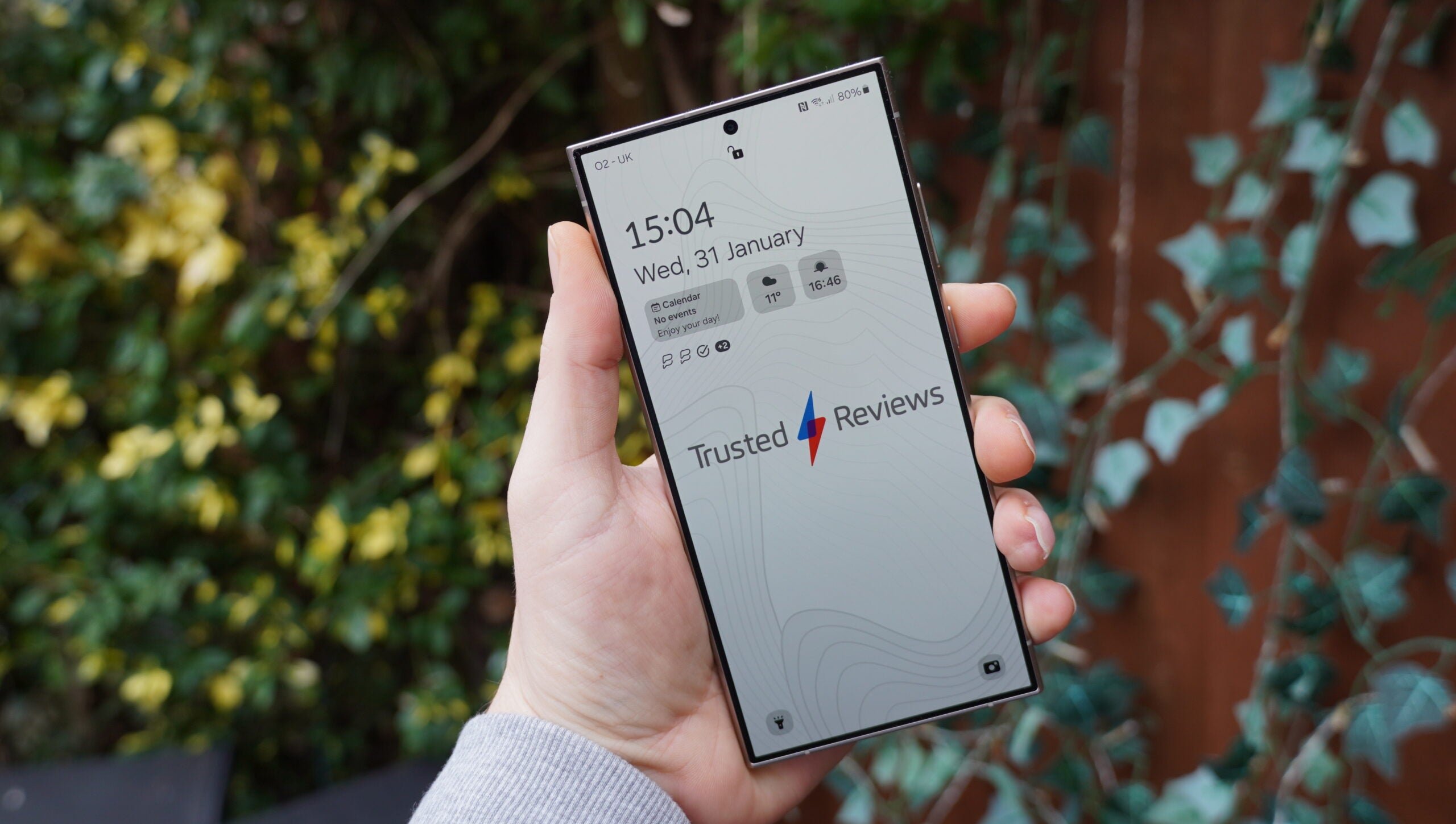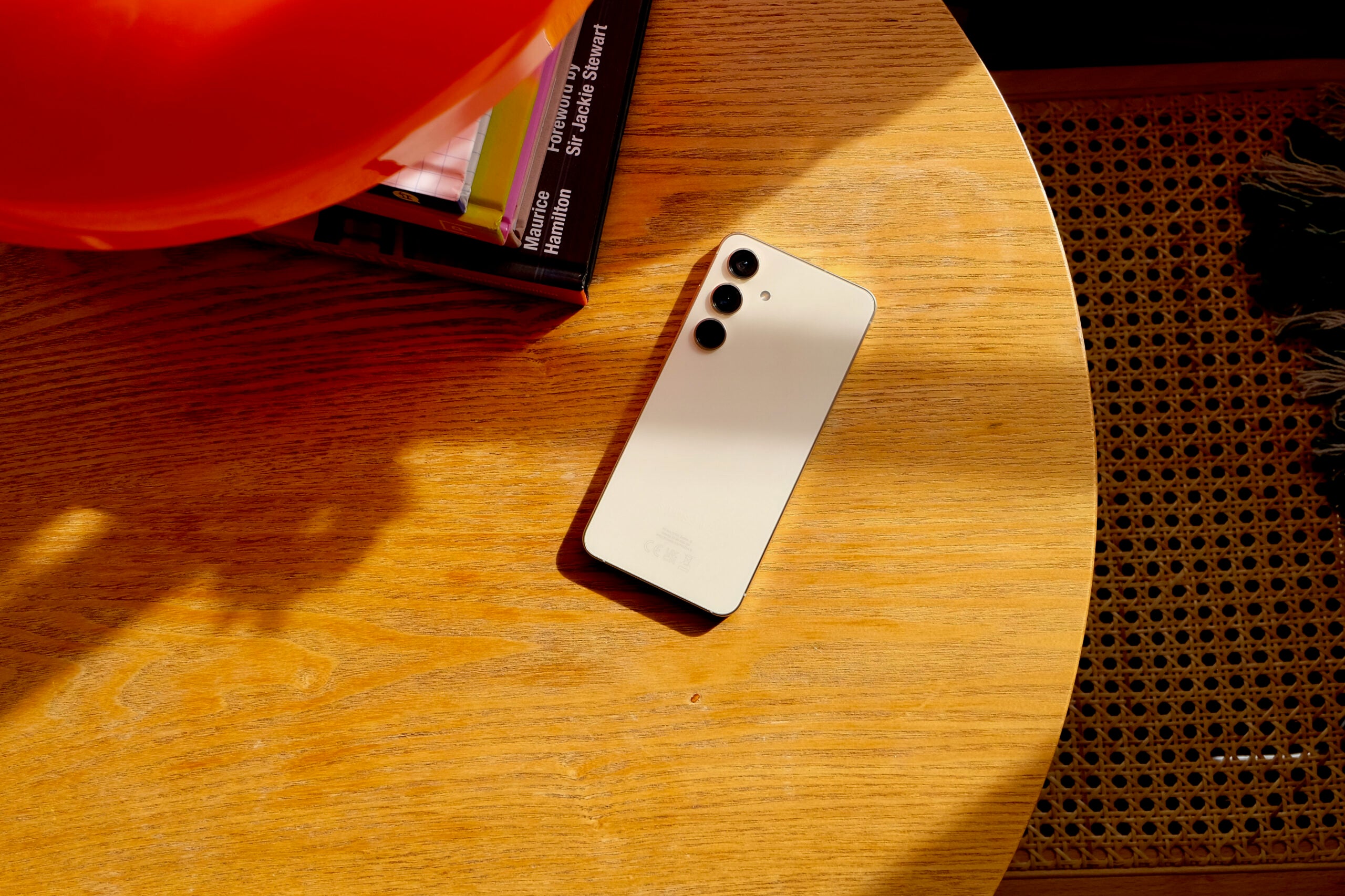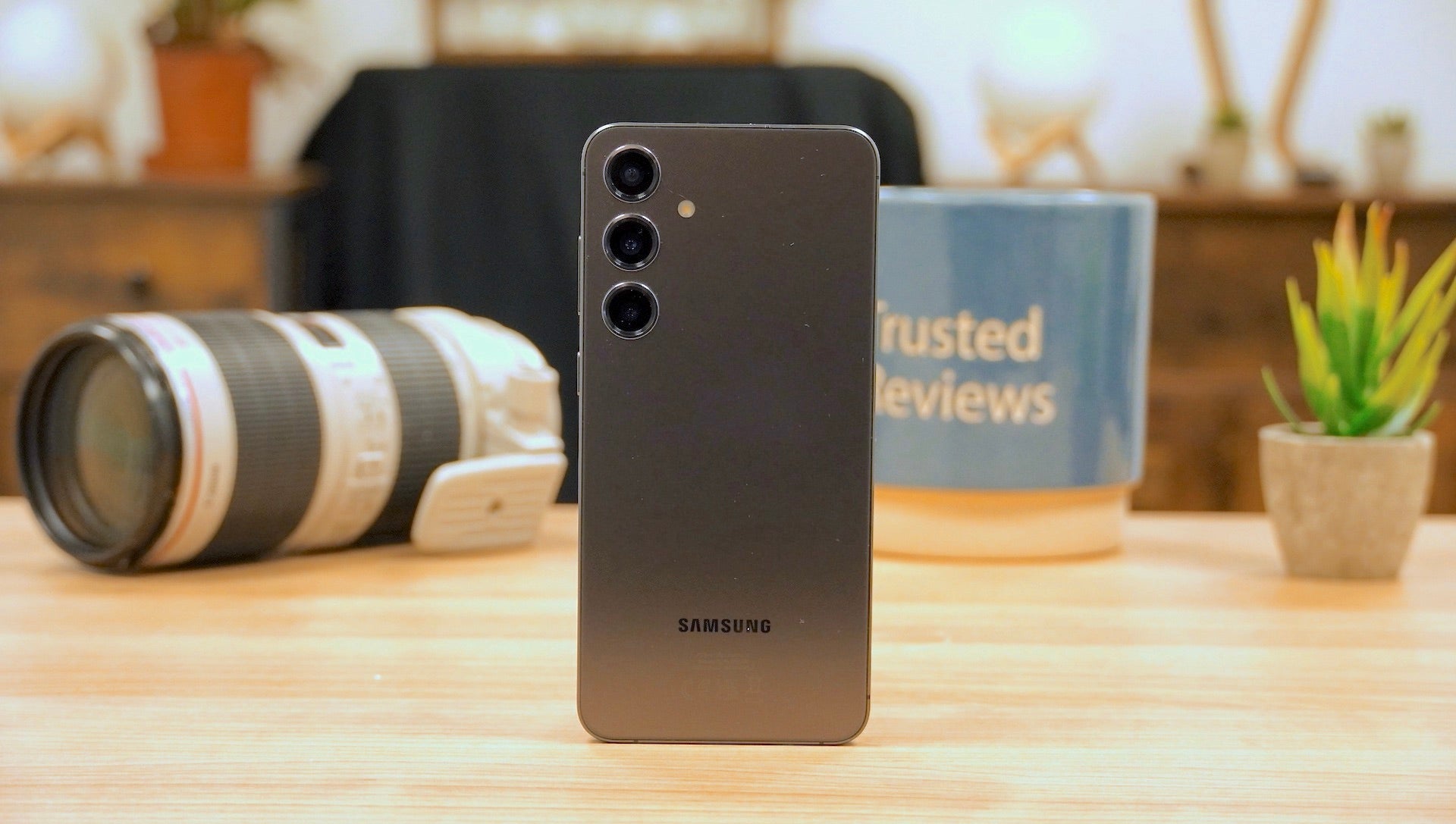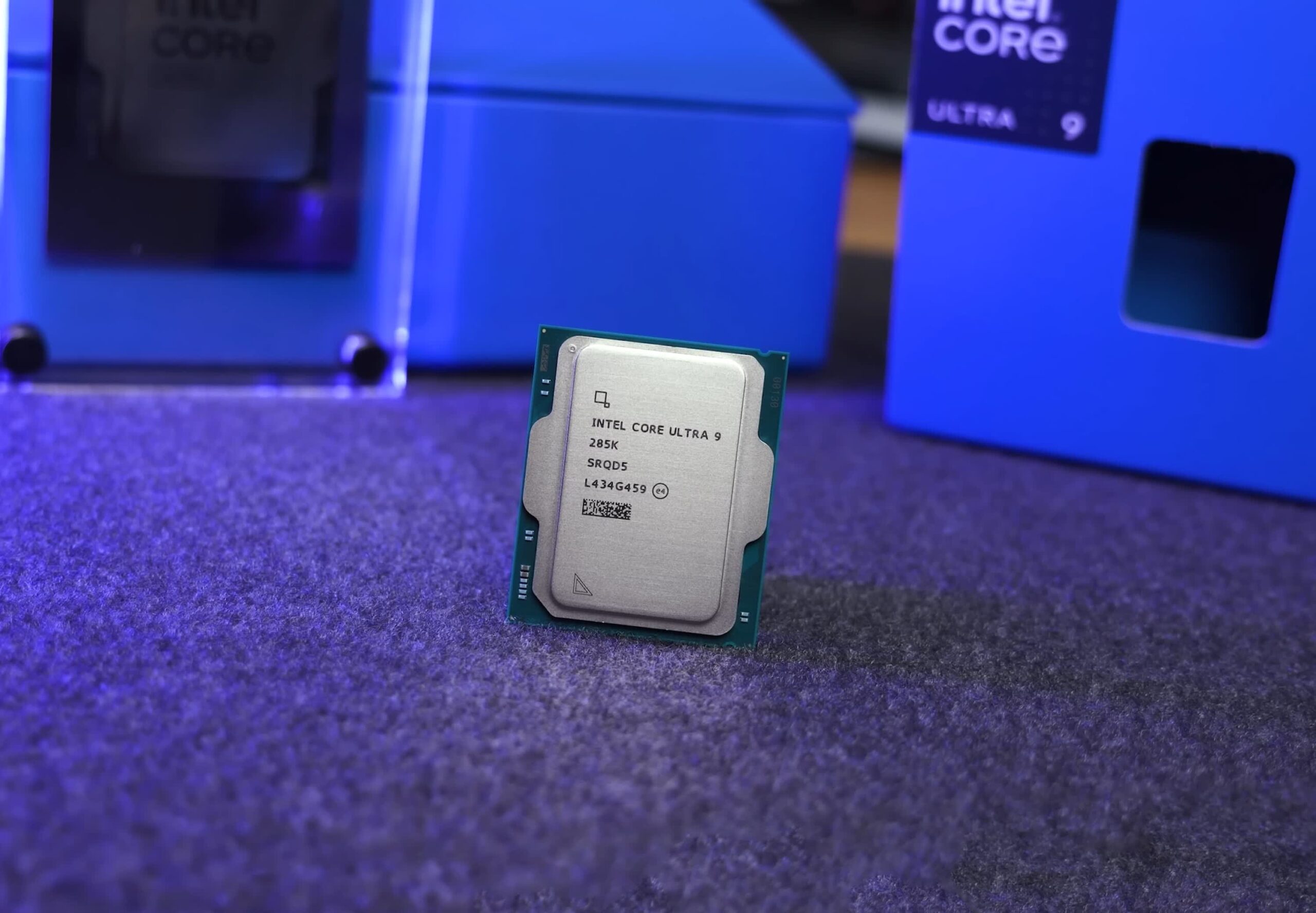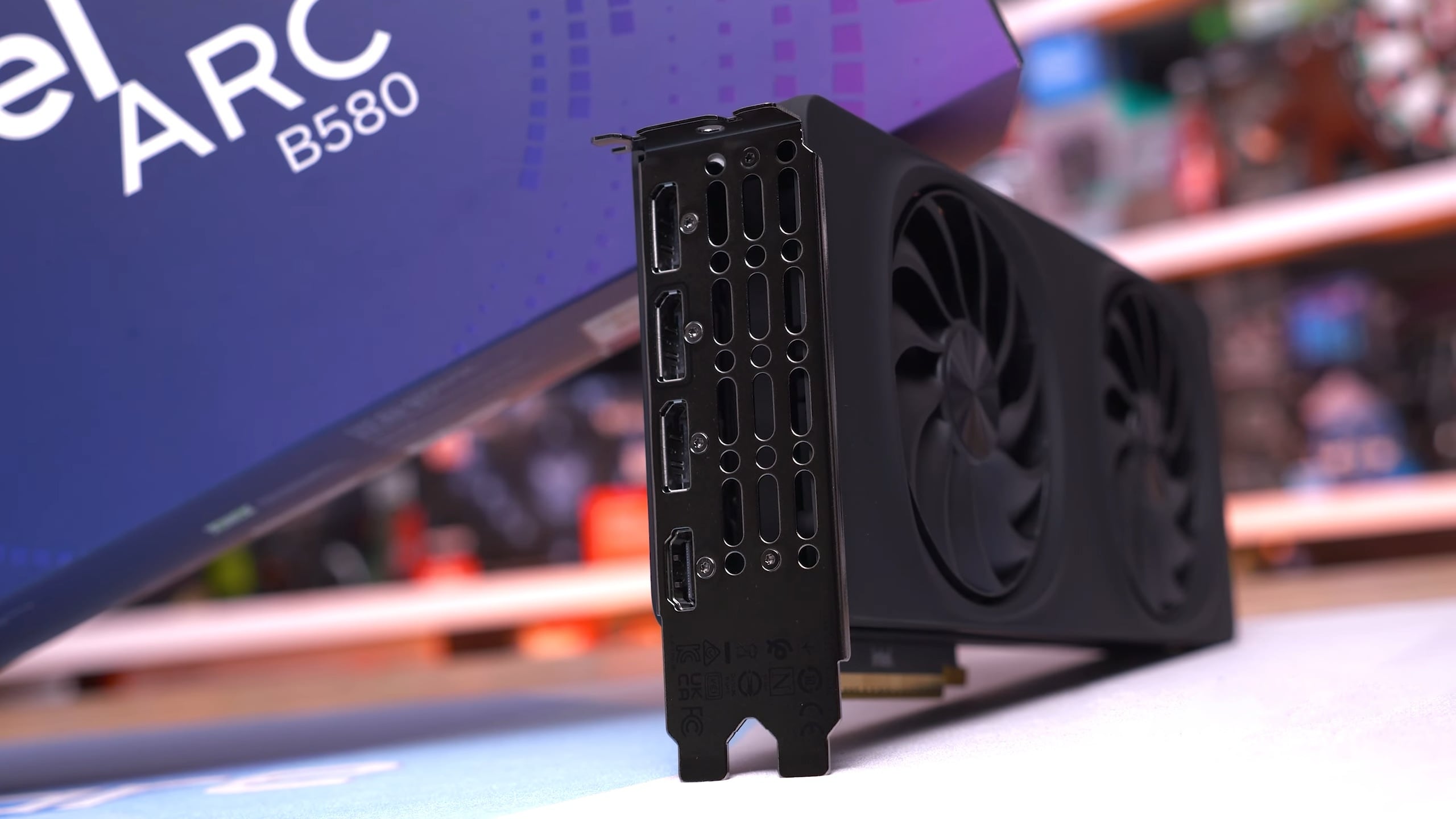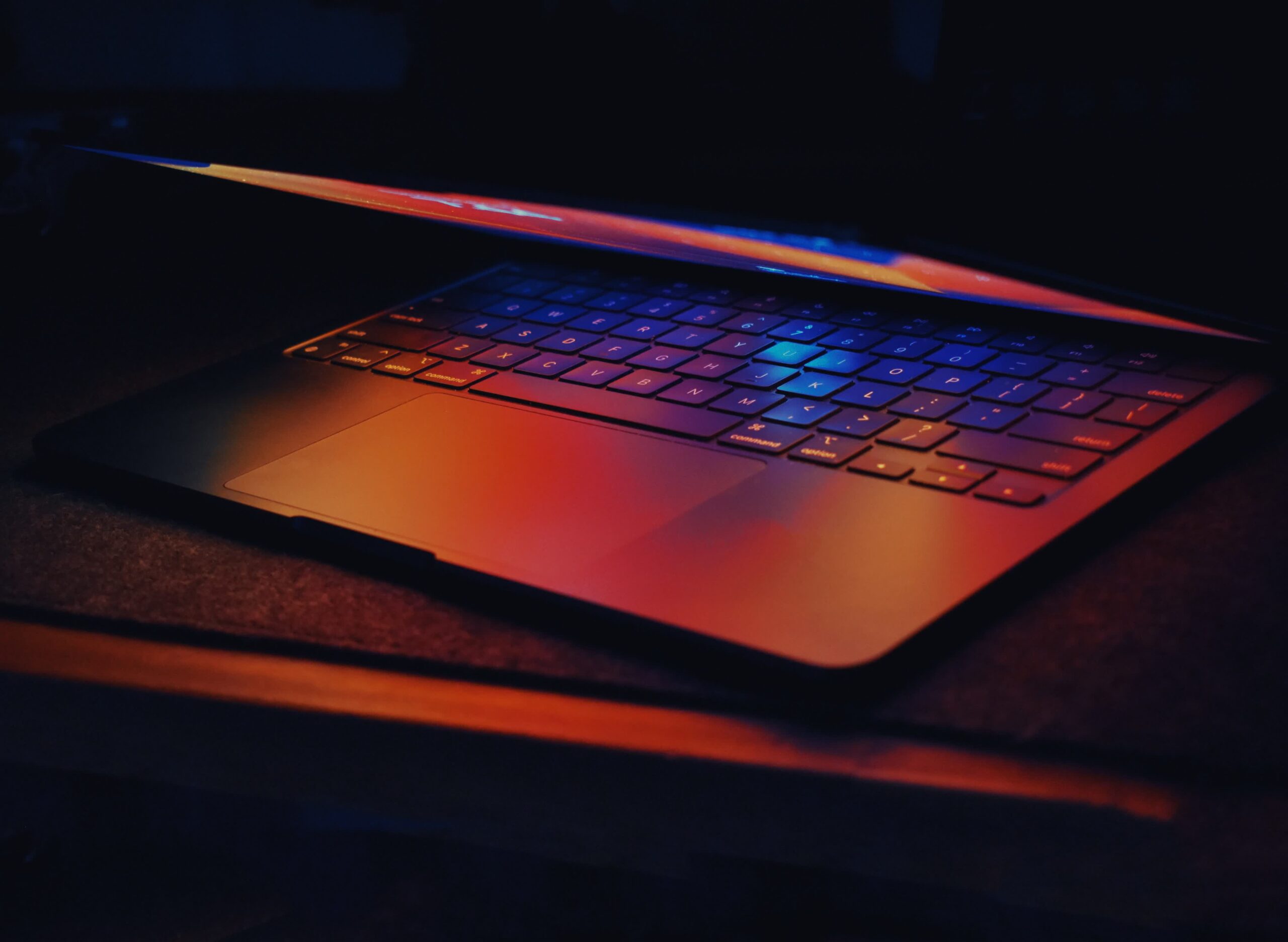Verdict
The Samsung Galaxy S24 Ultra is a phone that seems to do it all, with a high-end display, versatile cameras, excellent battery life and unique GenAI capabilities – but all that tech comes with a very high asking price.
Pros
- Genuinely useful AI features
- Versatile camera setup
- All-day battery life and then some
- Seven years of OS upgrades
Cons
- Very expensive
- Average ultrawide camera
-
New GenAI-powered toolsFrom real-time text and call translation to summarising websites and editing photos, new GenAI-powered tools are both fast and secure on the S24 Ultra. -
Flat 6.82-inch AMOLED displayThe curved screen of the S23 Ultra is no more, replaced by a flat 6.82-inch 120Hz AMOLED screen that provides a little more screen real estate for doodling with the S Pen. -
The S PenWhile not necessarily new to the S24 Ultra, the phone’s S Pen stylus remains a USP in the wider smartphone market. If you like to note-take or doodle, this is one of very few options avaialble to you.
Introduction
Almost a year after its initial release, the Galaxy-powered Samsung Galaxy S24 Ultra remains one of the best smartphones on the market.
While the Galaxy S24 Ultra may not look that different from the Galaxy S23 Ultra at a glance, a smattering of new and updated features, along with new GenAI-powered tools, breathe new life into the top-end Samsung flagship, keeping it new and exciting amidst increased competition from the likes of the Google Pixel 9 Pro XL and Honor Magic 6 Pro for the best phone and best Android phone of 2024.
After spending a few weeks with the new top-end flagship, I’m convinced that Samsung has crafted something wonderful for smartphone power users.
Design
- New Titanium finish
- Flat 6.82-inch display
- Gorilla Glass Armor protection
Samsung isn’t deviating too far from the aesthetic of the past few generations of Galaxy, especially when it comes to the Ultra model that essentially retains the same look as 2021’s Galaxy S21 Ultra. Still, there are a few meaningful changes on offer here.
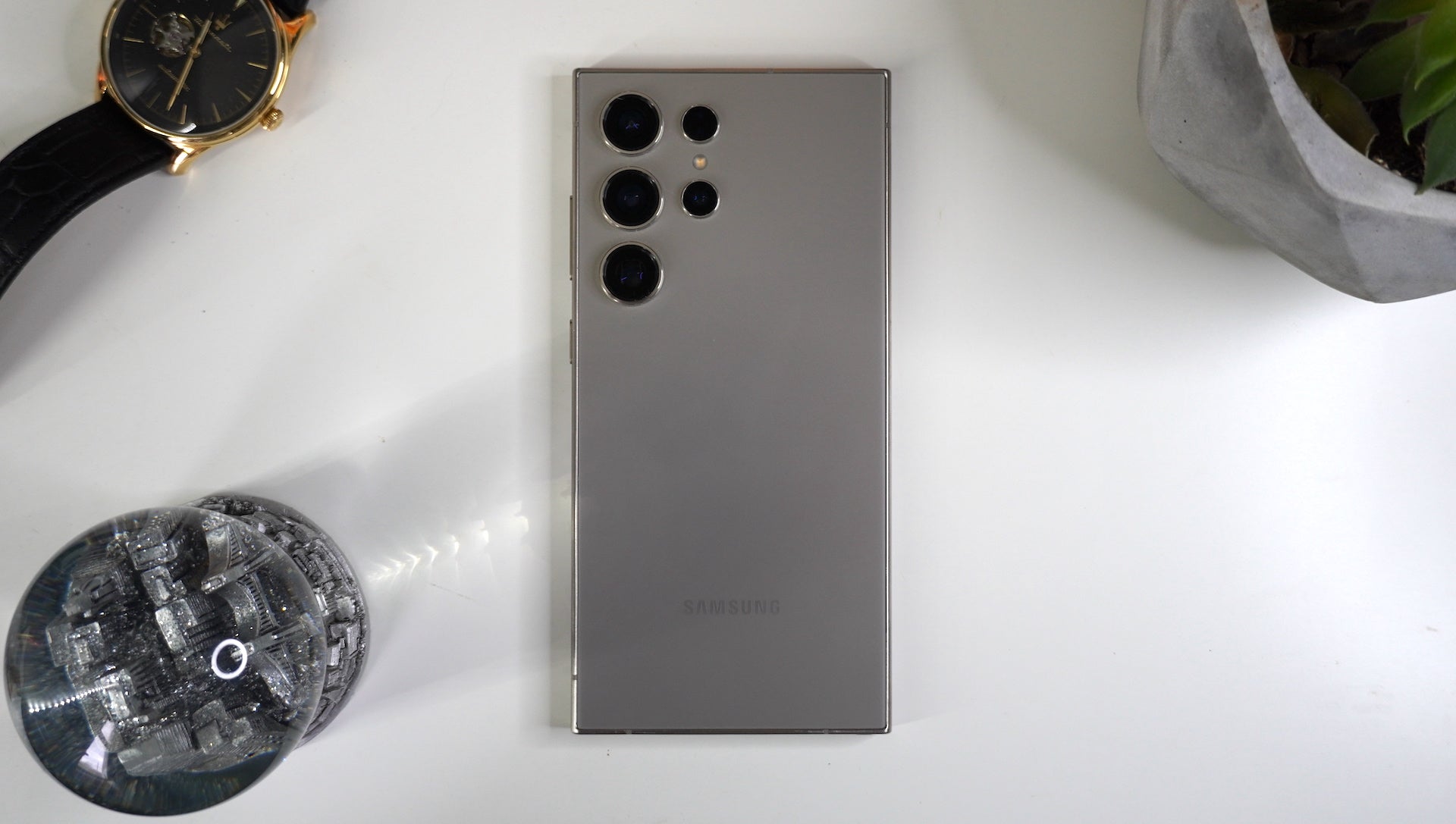
The new flat 6.82-inch display is the most instantly noticeable, a change from the curved panel in previous generations. While it may not sound like a big change, it makes a big impact on the look and feel of the phone while also expanding the digital canvas for all your S Pen doodles and note-taking. I prefer flat screens for usability, but you may feel differently.
Along with a flat screen, Samsung has shrunk both the bezels and the centrally-placed camera cutout to maximise screen real estate. This will be noticeable when next to the S23 Ultra, but even without the side-by-side comparison, there is a really high-end look to the screen.
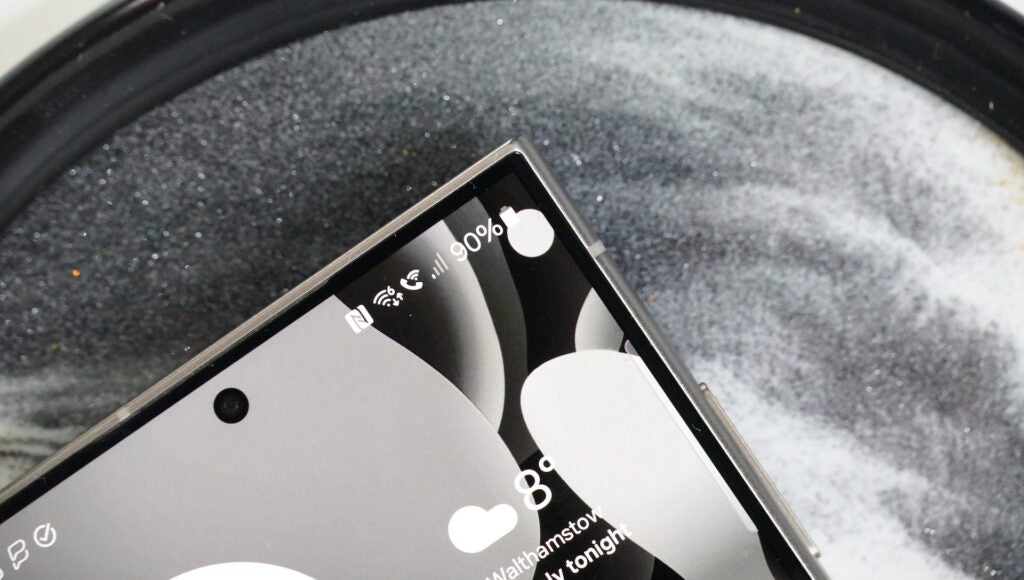

Samsung is also the first manufacturer to make use of the new Gorilla Armor that’s 4x stronger than previous iterations of protective glass while reducing reflections by 75%, which should bring added peace of mind when using the glass slab.
Another notable change with the Galaxy S24 Ultra is the material it’s made from; like Apple, Samsung has made the jump to titanium with the top-end smartphone.
Combined with the satin finish the metal provides, it feels nice and robust in the hand while providing a bit more grip than the glossy finish of previous models. It is not any lighter though, a big selling point for Apple’s switch to the material for the iPhone 15 Pro models.
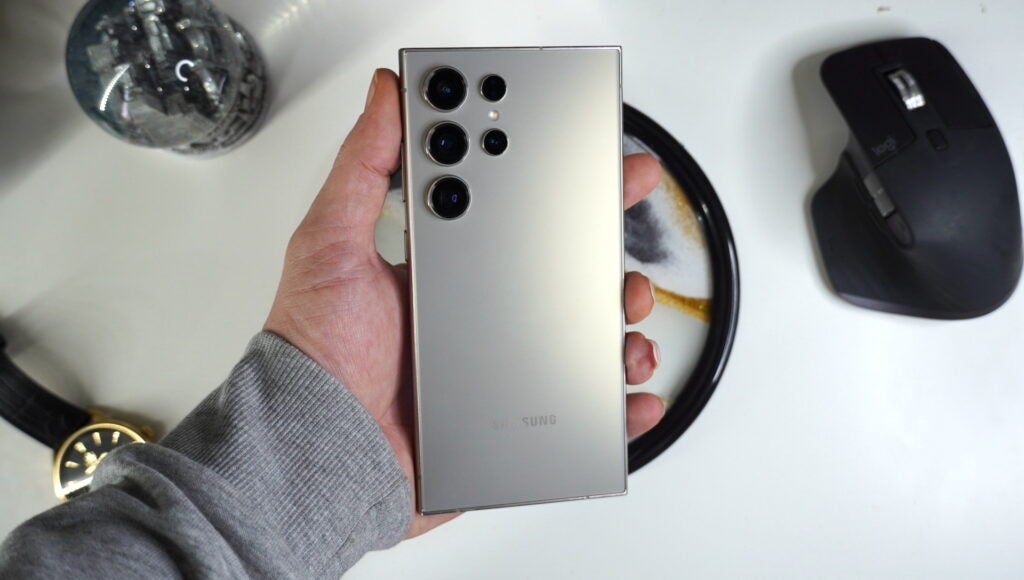

The colour options are a little more muted than previous generations, with grey, violet and yellow options across the board, along with exclusive orange, green and blue hues available directly from Samsung itself.
Changing gears a bit, Samsung has also doubled down on its environmental efforts with the S24 range with elements like recycled cobalt in the battery, recycled rare earth elements in the speakers and more, and the box is 100% recycled paper packaging that can be recycled all over again!
Screen and S Pen
- Pixel-packed QHD+ resolution
- Smooth 120Hz refresh rate
- The flat screen is great for S Pen doodling
It’s amazing how changing something small can have a drastic impact, but that’s exactly what has happened with the Galaxy S24 Ultra’s transition from a curved to a flat display. It sounds like a minor change, but the phone feels completely different and more complete than its predecessor, no doubt helped by impressively thin uniform bezels that add to that premium all-screen look.
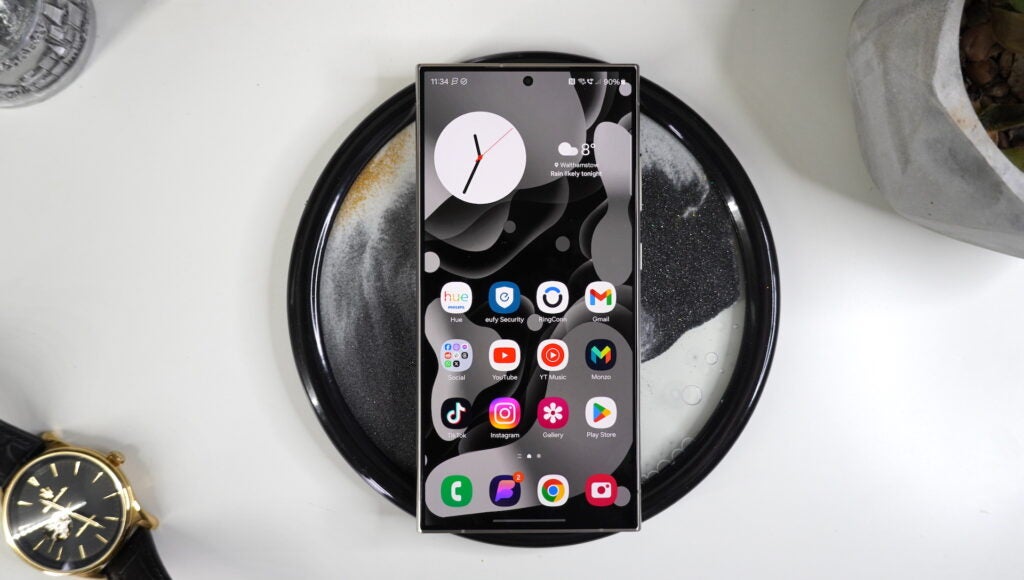

It’s an exquisite 6.82-inch AMOLED screen, boasting returning high-end tech favourites including an LTPO-enabled 1-120Hz refresh rate – though this is now standard across the S24 range – along with a QHD+ resolution.
There’s also a massively boosted 2600nits maximum brightness that makes the phone a breeze to use even in bright San Francisco sunlight, while also having a positive knock-on effect on HDR10+ content playback. It’s not quite the brightest around, but you’ll be hard-pressed to notice a difference in most scenarios.
Tech spec aside, the display is just stunning in everyday use. The pixel-packed resolution delivers crisp visuals whether you’re gaming or watching a movie on Netflix, with vibrant colours that make animations like Marvel’s What If? pop on the screen.


The transition to a flat display also benefits the S Pen, which as usual, is hidden away within the chassis of the phone, available with a press of the tip. It essentially means that there’s a slightly larger canvas for you to doodle on, with none of that screen real estate wasted on curved edges that you couldn’t write on before.
Aside from that, the S Pen experience is consistent with previous entries in the Ultra collection. It offers a top-end writing experience with no noticeable pen-to-screen lag with a 2.3ms response time that remains among the fastest around.
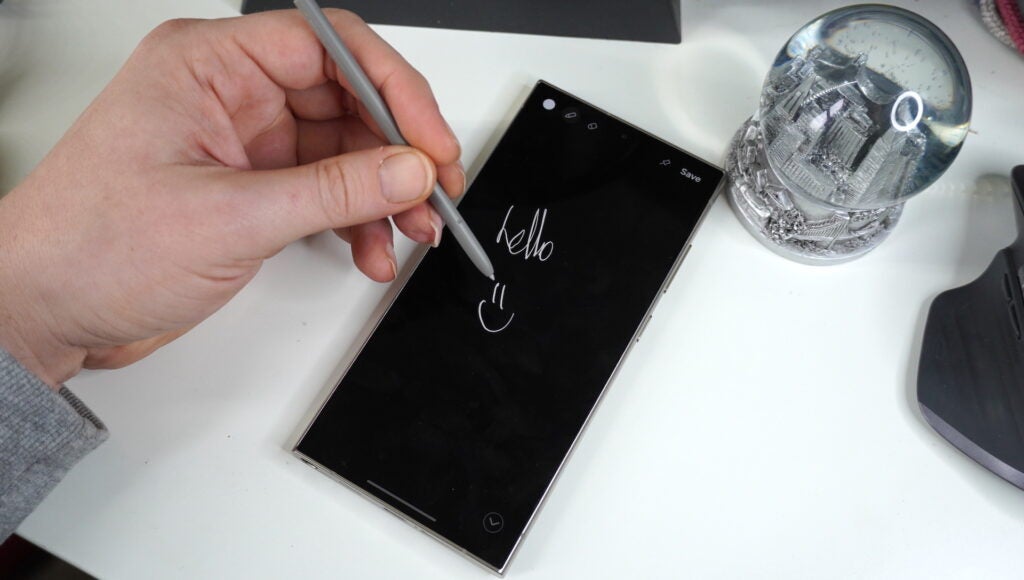

It also comes with a handy button that doubles up as a remote camera shutter, which brings me nicely onto…
Cameras
- Main, ultrawide and 3x cameras remain unchanged
- New 50MP 5x periscope lens
- Suite of new AI-powered editing tools
There has been a bit of controversy with the S24 Ultra’s camera setup this year, and it essentially boils down to the fact the 10MP 10x periscope lens has been reduced to 5x.
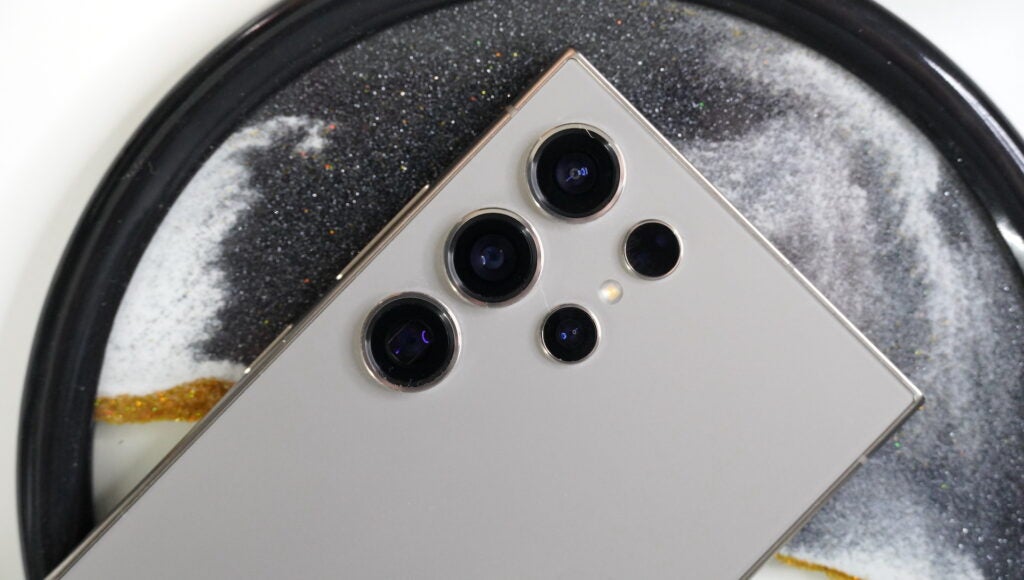

However, with an increased 50MP adaptive pixel sensor, larger pixels and 2x wider OIS, the quality of images easily surpasses those of the previous generation at the 10x mark. It also allows the S24 Ultra to provide optical-quality zoom from 0.6x through to 10x, making it the most versatile mobile shooter from Samsung yet.
The new 50MP 5x periscope lens allows for much better performance between 5x and 10x with quality not that far from what you’ll find from the main lens, allowing you to freely zoom in and out without worrying about degrading image quality.
It’s great not only for portrait photography but for any subject you want to get a little closer to – buildings in the distance, a cool car driving by and the like – with great clarity, accurate colours and a balanced dynamic range.
The 5x sensor delivers lower quality shots at extreme zoom levels (think 30x onwards) but given that most people will use 5x-10x way more than 30x-100x, I think it’s a fair trade-off.
Elsewhere, the camera experience remains solidly flagship-level – if not a little familiar.
The Galaxy S24 Ultra’s main 200MP snapper is just as capable as it was a year ago – and considering it delivered some of the best results around, that’s not that bad. The S24 Ultra can capture a stunning shot with little effort, with images usually packed with detail, vibrant colours (sometimes too much), and exceptional dynamic range.
That’s just as true in low-light conditions, with Samsung continuing to deliver some of the best low-light performance around, even compared to the likes of the Pixel 8 Pro and iPhone 15 Pro Max. It’s not quite on the same level as the 1-inch sensor of the Vivo X100 Pro, but it’s not that far off either.
That somewhat extends to the twin OIS-enabled zoom lenses, though with narrower apertures, results won’t be on quite the same level as those from the main sensor. The ultrawide notably struggles at night, however, with visible distortion from light sources like street lamps in sample shots.
The ultrawide does an otherwise solid job when not taking photos at night. It’s not as exceptional as the other lenses with a fairly standard spec of 12MP and f/2.2, but it takes expansive shots ideal for architecture and group selfies, and there’s not much in the way of edge distortion here either.


The 10MP 3x OIS-enabled telephoto, now with a much less stressful job of only managing 3x-4.9x zoom, remains a solid shooter with colours and detail consistent with that of both the main lens and the 5x periscope lens that makes it a great intermediary between the two.
For me, though, it’s the ProVisual Engine’s new AI-powered photo editing tools that are most exciting. Heading into the Gallery app after snapping a few photos, I was presented with bespoke edit suggestions based on each shot.
You can also use Google Pixel-esque eraser features to remove distractions from images with decently accurate generative fill, and using Generative Edit, you can fix a crooked image and have the phone fill in the blanks from the borders.
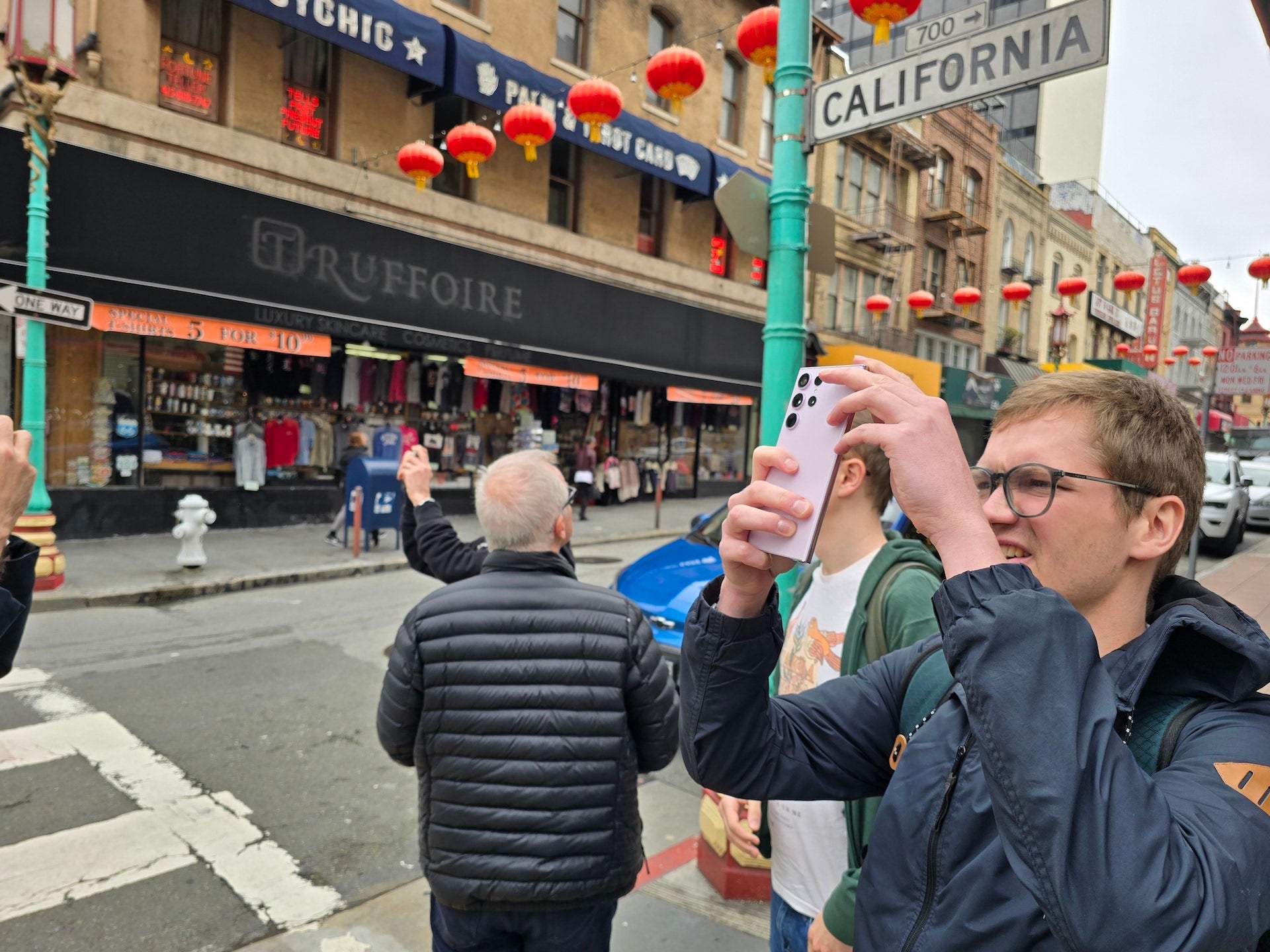
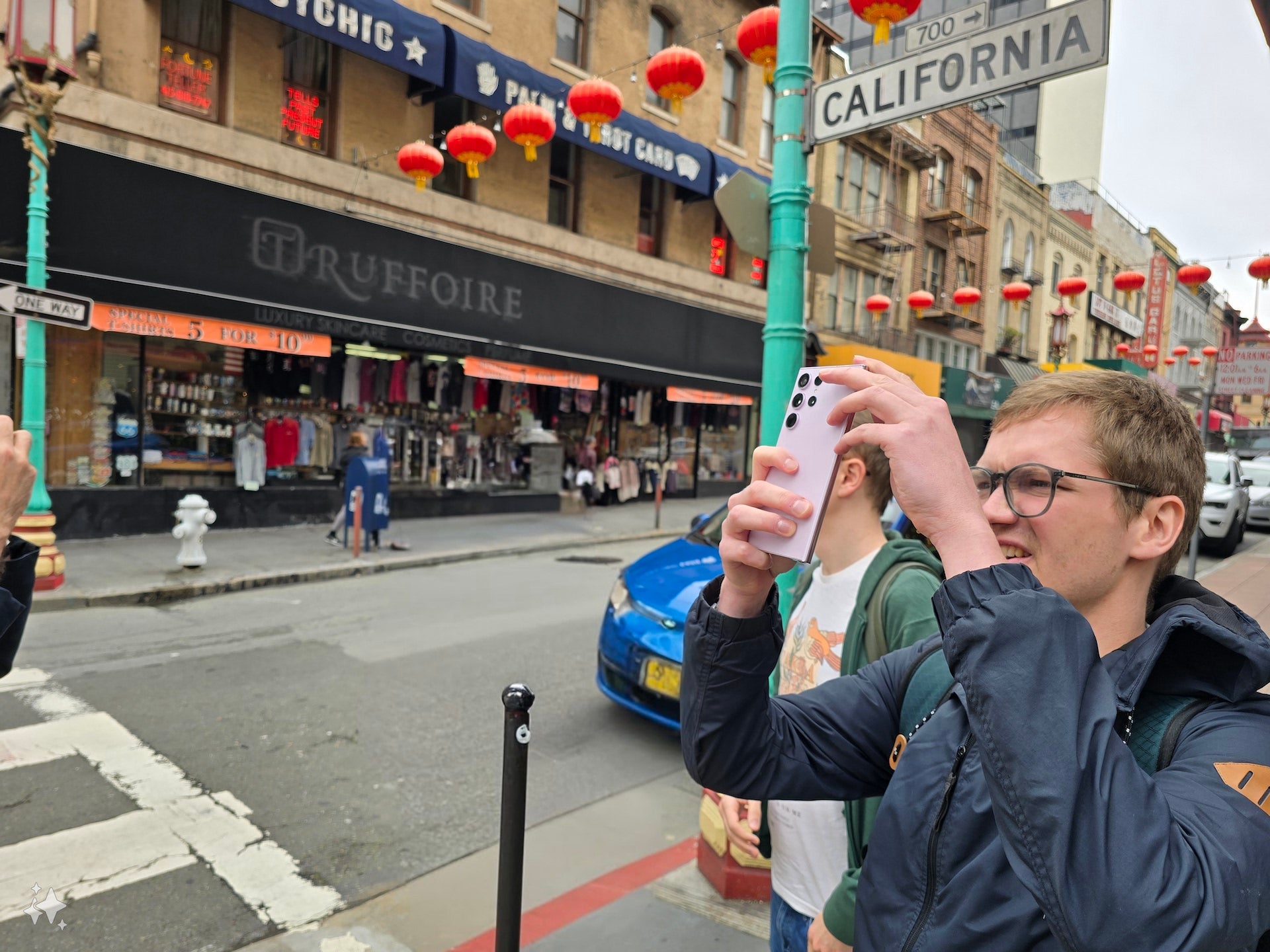
You can even move the subject of the photo for better framing, with the phone filling in the blanks from the image with varying results, and you can turn regular 30fps videos into super slow-mo videos with a tap of the screen too.
This won’t be anything new to you if you’re a Google Pixel user – most of these have been long-time features of Google’s AI-focused smartphone range – but it’s the first time we’re seeing them from other Android manufacturers, and it makes Samsung’s top-end camera phone even more capable.
The best part? Samsung’s AI focus doesn’t end with camera editing tech.
Performance and Galaxy AI
- New GenAI-powered tools
- Snapdragon 8 Gen 3
- Top-end everyday performance
The main driver behind the Galaxy S24 Ultra’s new AI-powered photo editing tools is Galaxy AI, an all-encompassing umbrella term for a bunch of new GenAI-powered tools available on the S24 range.
That starts with the phone’s keyboard, with a new Galaxy AI icon that, when tapped, provides the ability to not only rewrite what you’ve written to change your tone (formal, friendly, social-media-focused, etc) but translate it to 13 languages, which should help overcome the language barrier we sometimes face.
That also extends to the Phone app with live translation, allowing you to converse in your native tongue and have the phone reply in the recipient’s language. It’ll also display a text transcript of the conversation in real time.
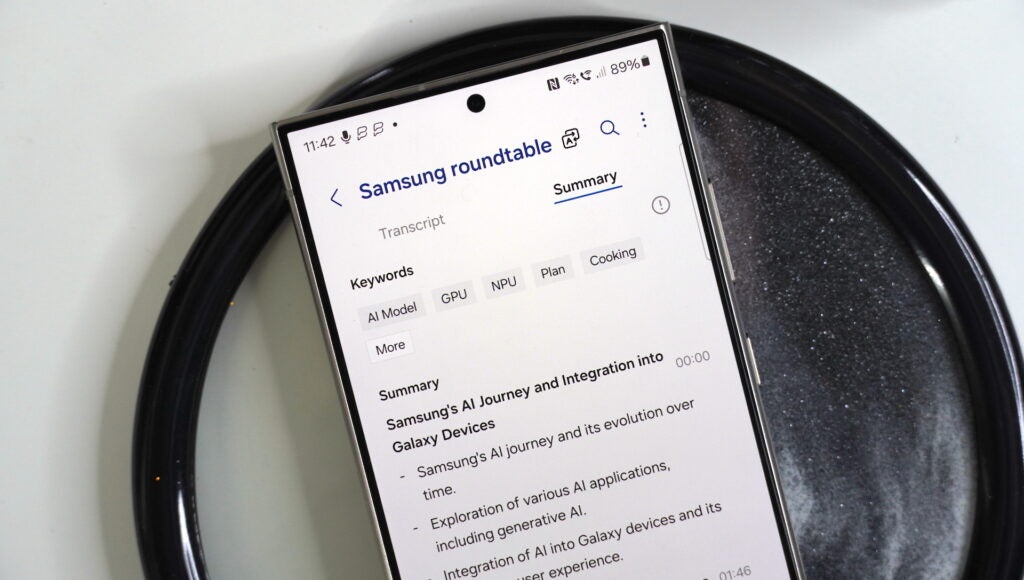

My personal favourite is the AI-powered Notes app, which can transcribe and translate a conversation in real time – with the ability to tell the difference between different speakers – and then automatically summarise the recording in bullet point form. It’s not always perfect, but it’s still close enough to be useful, and you can tap any point in the summary to hear the relevant section of audio to confirm too.
The latter is also available in the Samsung Internet app, allowing you to quickly summarise huge chunks of text into bite-sized ones, though I still prefer the Google Chrome experience overall.
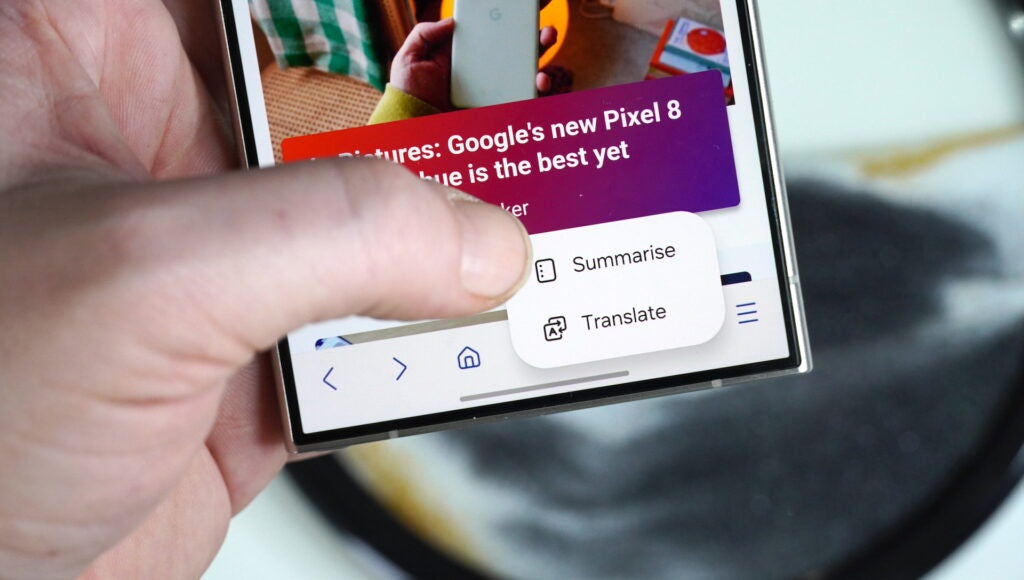

Crucially, everything I’ve mentioned here all happens on-device, meaning it’s both fast, negating the need for an active internet connection, and it’s more privacy-friendly too. It may not be the AI-powered phone of the future, but these are exciting first steps, and Samsung remains one of few manufacturers to truly make use of generative AI at an OS level.
That’s all possible via the use of the Snapdragon 8 Gen 3 for Galaxy, a custom version of Qualcomm’s top-end 2024 chipset, along with 12GB of LPDDR5X RAM and between 256GB and 1TB of UFS 4.0 storage depending on the variant you go for. However, there’s no microSD card slot, so you’ll have to choose carefully.
Generative AI capabilities aside, the Galaxy S24 Ultra is as rapid as you’d expect, both in benchmark testing and real-world use. It easily competes with some of the most powerful smartphones, including the Asus ROG Phone 8 Pro, though its QHD+ resolution hinders graphical performance compared to FHD+ alternatives.
Crucially, the Samsung Galaxy S24 Ultra feels, excuse the pun, ultra-fast in everyday use. Apps open instantly, stay open for longer in the background and the phone can power some pretty damn high-end mobile games including both Genshin Impact and Call of Duty Mobile. However, it can get a little hot over extended periods of use.
It’s also worth noting that the S24 Ultra is the only model with the Snapdragon 8 Gen 3, with the regular S24 and S24 Plus sporting an Exynos 2400 for Galaxy chipset in Europe. Those in the States, however, will get the 8 Gen 3 across the range.
Samsung claims that the two chipsets are near-identical both in terms of general performance and AI prowess – though how true that is remains to be seen. It’ll certainly be interesting to benchmark the regular Galaxy S24 and S24 Plus in the coming weeks to see how they compare to this Snapdragon-powered beast.
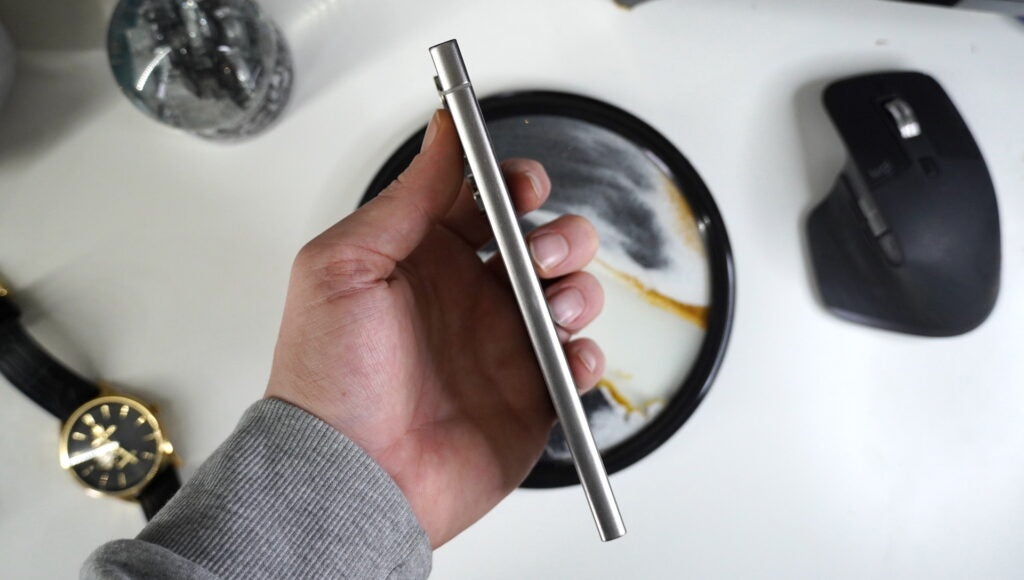

Software
- OneUI 6 introduces handy new features
- Charming approach to Android
- Seven years of OS upgrades
The Samsung Galaxy S24 Ultra comes running Android 14 with Samsung’s OneUI skin on top. While I’m not usually a huge fan of custom Android skins, Samsung’s OneUI 6 is one of few to turn my head – and for good reason.
The latest version of OneUI introduces a range of tweaks and new features to the Samsung experience that give it a much-needed refresh. You’ll find a redesigned notification shade with a better quick settings layout and small tweaks like the ability to access the full quick settings menu with a swipe down from the right-hand corner – à la iPhone.
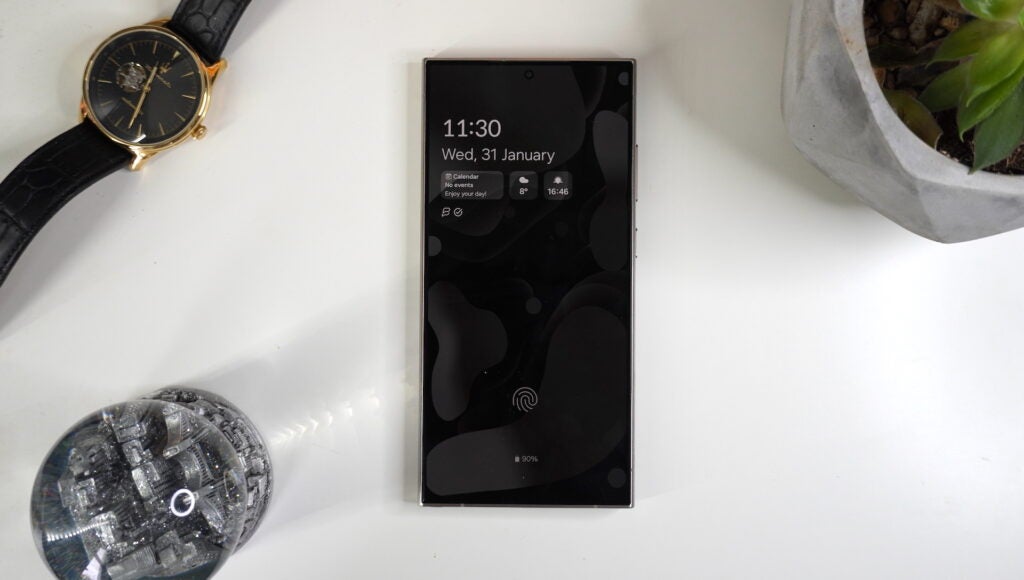

Speaking of iPhone comparisons, OneUI 6 also allows for LTPO-enabled smartphones – including the S24 range, as well as last year’s S23 Ultra – to provide a true always-on display, with notifications, widgets and even your wallpaper visible.
I also like that Samsung hasn’t locked its widget stacking capabilities to first-party widgets like Honor’s MagicOS and OnePlus’ OxygenOS. That means you can add multiple first- and third-party home screen widgets into one space, and swipe between them to access them when needed.
There’s also Google Circle to Search functionality that was exclusive to the Galaxy S24 at its reveal but has since made it to Pixel phones via an update. So it’s not even exclusive by the time the phone is available to buy…
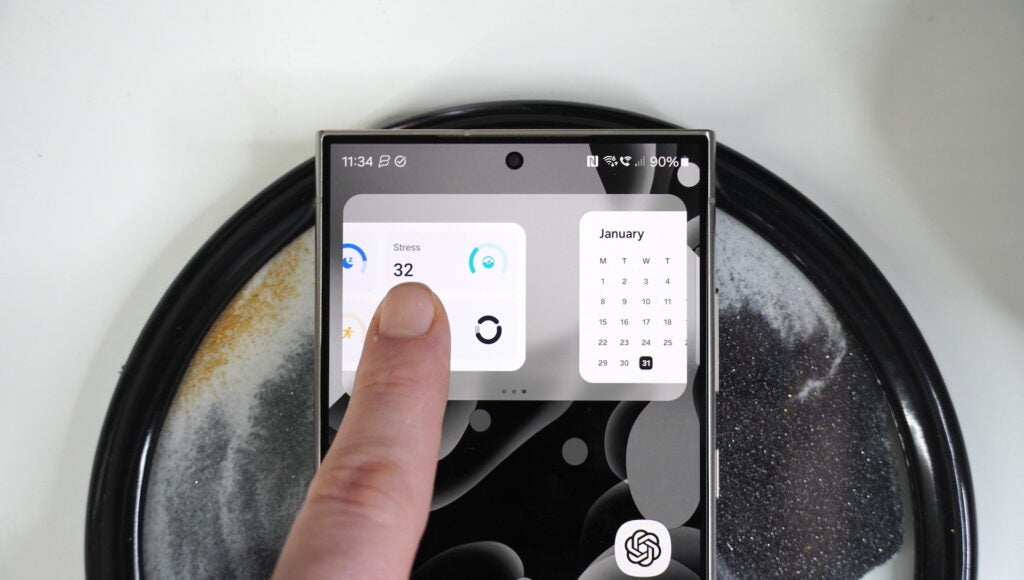

Technicalities aside, Circle to Search is an amazing feature I’ve used much more than Google Lens. Essentially, you can tap and hold the Home button on the phone and then scribble or circle over something you’d like to find out more about. This can be on any app, any website, any time, and it works incredibly well for most enquiries.
That’s especially true of landmarks – I’ve got correct results from plenty of images I’ve searched, down to a rather obscure interior shot of Kings Cross St. Pancras. Sure, it won’t work for everything, but it’s bang-on most of the time.
Individually, these features (and plenty I’ve not mentioned here) may not be game-changing, but collectively, they deliver a refreshed, more helpful experience than those that came before it.
What’s also nice to see is Samsung competing with Google’s upgraded Pixel 8 software promise, offering seven OS upgrades and seven years of security patches that’ll see it through to the release of Android 21.
Battery life
- True all-day battery life
- Very power efficient
- Full charge in just over an hour
There’s a trend arising from the first Snapdragon 8 Gen 3 devices on the market: they’re incredibly battery efficient. That’s just as true of the Samsung Galaxy S24 Ultra as the OnePlus 12, with no qualms about delivering a full day of battery life with some juice left in the tank to spare.
I went all-out and enabled optional settings like the QHD+ resolution, 120Hz refresh rate and image sharpening tech during testing, as well as having the AOD always on, and I’d still get to bedtime after a 16-hour day full of texting, gaming and plenty of scrolling on TikTok with around 50-60% left. In fact, a full hour of TikTok doomscrolling only drained 4% battery. Do with that information what you will.
Over the past few weeks, I’ve found that the phone will provide around 7-8 hours of screen-on time per charge, which is pretty damn exceptional and way longer than the vast majority of people will use their phones for on average. My battery anxiety has been completely alleviated with this phone, and that’s a very nice feeling indeed.
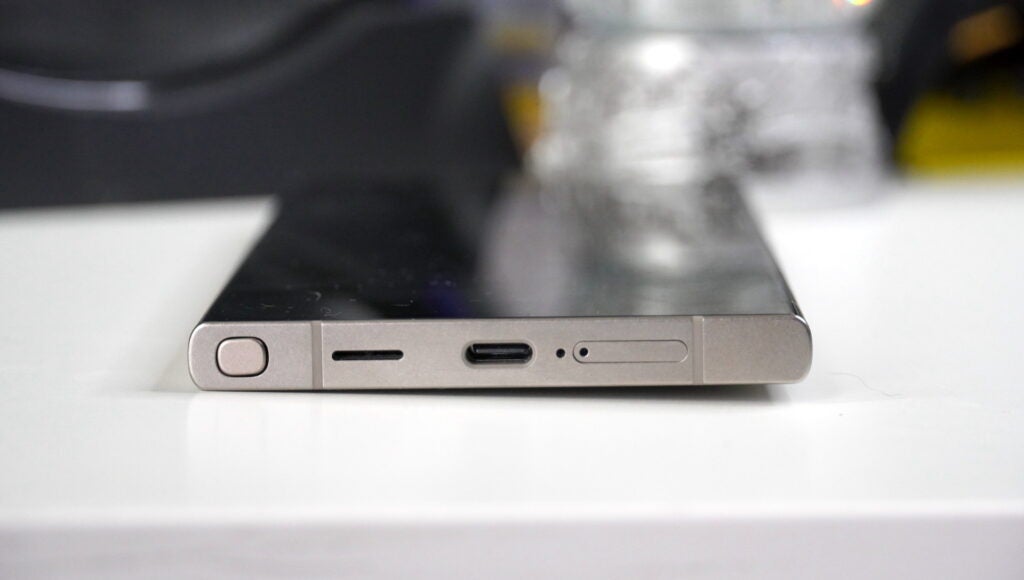

The 45W charging may not be the fastest around, and the fact that there isn’t a charger in the box means you very likely won’t be charging it with a 45W charger, but it is worth investing. Using a compatible 45W USB-C charger I had lying around, the Galaxy S24 Ultra regained a full charge in 71 minutes, hitting the 50% mark in 26 minutes.
Sure, that’s quite a bit slower than fast-charging legends like the OnePlus 12, achieving 100% charge in 26 minutes, but that’s still pretty solid if you need to get a last-minute top-up.
Latest deals
Should you buy it?
You want a solid all-round smartphone
With a high-end display, capable cameras, powerful performance and excellent battery life, the Galaxy S24 Ultra ticks most of the right boxes.
You want an affordable phone
The Galaxy S24 Ultra might offer it all, but it has a high-end £1,249/$1,299 price tag to match. Plenty of capable premium phones don’t cost quite as much.
Final Thoughts
Though it may look similar to its predecessor, several meaningful changes keep the Galaxy S24 Ultra an interesting option for the 2024 market.
That’s down to a combination of new and old suspects. The S24 Ultra’s camera setup is more versatile than ever, even with a supposed downgrade from 10x to 5x on the periscope front. It is effortless to capture great photos on the S24 Ultra, and you don’t need to worry about zoom downgrading overall image quality for the most part.
There’s also the large 6.8-inch AMOLED screen that’s gone from flat to curved with this year’s model, and though it sounds like a small change, it has a big impact on not only how the phone looks and feels in hand, but how you use it – especially when paired with the S Pen.
It’s Galaxy AI that truly shines though; for the first time, Gen AI-powered features like voice dictation, real-time translation and photo editing features are available on a non-Pixel smartphone, making the S24 Ultra more capable than ever. Even with improved AI smarts from the likes of Google with the Pixel 9 Pro XL, Galaxy AI still shines.
Paired with true all-day battery life, seven years of OS upgrades and top-tier everyday performance, it’s hard to see why you’d opt for anything else at this point in 2024. The only hangup remains the price, starting at an eye-watering £1249/$1299 which makes even premium alternatives like the iPhone 16 Pro and OnePlus 12 look all the more tempting.
How we test
We test every mobile phone we review thoroughly. We use industry-standard tests to compare features properly and we use the phone as our main device over the review period. We’ll always tell you what we find and we never, ever, accept money to review a product.
Find out more about how we test in our ethics policy.
Used as a main phone for over a week
Thorough camera testing in a variety of conditions
Tested and benchmarked using respected industry tests and real-world data
FAQs
Despite offering 45W fast charging, the Galaxy S24 Ultra doesn’t ship with a charger.
Yes, with IP68 dust and water protection, it should survive in 1.5m of water for up to 30 minutes.
Samsung is matching Google’s extended seven years of OS upgrades with the S24 range.
Trusted Reviews test data
Geekbench 6 single core
Geekbench 6 multi core
Max brightness
1 hour video playback (Netflix, HDR)
30 minute gaming (light)
Time from 0-100% charge
Time from 0-50% charge
30-min recharge (no charger included)
15-min recharge (no charger included)
3D Mark – Wild Life
GFXBench – Aztec Ruins
GFXBench – Car Chase
›
UK RRP
USA RRP
Manufacturer
Screen Size
Storage Capacity
Rear Camera
Front Camera
Video Recording
IP rating
Battery
Wireless charging
Fast Charging
Size (Dimensions)
Weight
ASIN
Operating System
Release Date
First Reviewed Date
Resolution
HDR
Refresh Rate
Ports
Chipset
RAM
Colours
Stated Power
›
